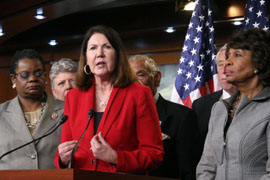Violence Against Women reauthorization adds protections for tribal women

By Michelle Peirano
Cronkite News
Provisions in the reauthorization of the Violence Against Women Act that would affect Native American women include measures that would:
• Give tribal courts jurisdiction over anyone who commits crimes of domestic or sexual violence in Indian Country, as long as it is equal with the jurisdiction of the U.S. government.
• Let tribal governments enforce protection orders for anyone on tribal lands and ban violators from re-entering those lands.
• Fund law enforcement, courts, probation systems, detention facilities, rehabilitation centers, victim services and other projects with $5 million each year for four years.
WASHINGTON – Tribes will be able to prosecute non-Native abusers in tribal courts under an expansion of the Violence Against Women Act that won final approval Thursday.
President Barack Obama has already said he will sign the bill, which also expands domestic violence protections for immigrants, extends them to same-sex couples and includes funding for such programs.
“It’s a great victory for women everywhere but especially tribal women,” said Rep. Ann Kirkpatrick, D-Flagstaff, a strong supporter of the bill.
First passed in 1994, the act funded shelter, counseling, legal and other services for victims of domestic abuse. But it expired in 2011 and efforts to renew it failed in the last Congress.
The newer, expanded law passed the Senate two weeks ago and headed to the House, where some Republicans were pushing their own, more-narrow measure that removed language on tribal prosecutions and same-sex couples, among other changes.
“The House version protects every single person. Period,” said Rep. Trey Gowdy, R-S.C., of the proposed GOP alternative.
But the House easily beat back that version before passing the Senate bill 286-138 and sending it to the president.
For Arizona lawmakers, the final vote split along party lines with all four Republicans opposing it and all five Democrats supporting.
Clara Pratte, executive director of the Navajo Nation Washington Office, said final passage took supporters by surprise.
“We’ve been concerned for months, so it was nice not to have an ulcer today,” Pratte said. “We’re just really happy about what this means for Indian Country, what this means for tribal sovereignty and what this means for the victims of domestic violence we are trying to protect.”
Currently, only federal courts can prosecute a non-Indian accused of domestic violence or sexual assault against an Indian woman, but advocates say U.S. attorneys often fail to pursue such cases.
That changes under the new law, which gives tribal courts jurisdiction in those cases that involve non-Indian perpetrators and Indian women. Pratte said winning that right was the biggest battle – and biggest victory.
She said the Navajo Nation will move slowly as it begins to exercise its new authority.
“It’s going to take some groundwork because the world is watching,” Pratte said. “We want to make sure we are protecting everyone’s rights. That’s a huge responsibility.”
The bill also includes $5 million a year for four years to help tribes implement more victim services. That is a much-needed boost, said Jeanette Aston, executive director of Mount Graham Safe House, a non-tribal crisis center that serves the San Carlos Apache.
“The services offered for San Carlos and the other tribes are very limited,” Aston said. “We can’t keep an office on the reservation because we don’t have money to keep them there.”
She said the crisis center receives federal funding, but it is never enough, and tribes really need their own shelters. Most Indian women do not seek help or push for prosecutions because they have to travel far from home for those services, she said.
“The tribe needs some sort of shelter where the victim can stay in the community and be safe,” Aston said.
Pratte agreed that domestic violence and sexual assault services currently “operate on a shoestring budget,” which is why the additional funding in the bill is so welcome.
Other tribal leaders also hailed passage of the bill.
Navajo President Ben Shelly was addressing a coalition of large tribes at the Capitol when the vote came Thursday, said Jared King, a spokesman for the Navajo Nation office. When Shelly announced that the bill had passed, the room erupted in cheers and claps, King said.
“It was a pretty powerful moment,” he said.
Kirkpatrick said supporters had been holding their breath for weeks while they waited to see what would happen.
“Even yesterday, it looked like it was going to be an uphill battle,” she said. “I would like to think … people really heard it.”















